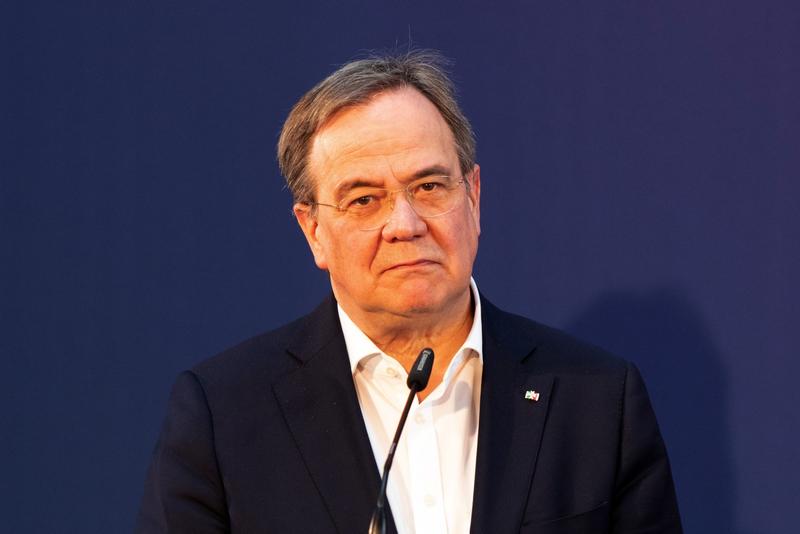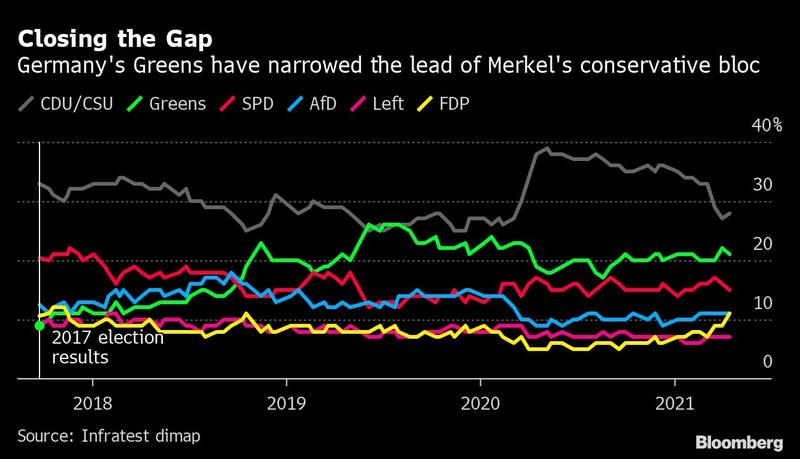 Armin Laschet, Christian Democratic Union (CDU) leader, pauses during a news conference following a caucus meeting of Germany's ruling coalition in Berlin, Germany, on April 11, 2021. (PHOTO / BLOOMBERG)
Armin Laschet, Christian Democratic Union (CDU) leader, pauses during a news conference following a caucus meeting of Germany's ruling coalition in Berlin, Germany, on April 11, 2021. (PHOTO / BLOOMBERG)
Armin Laschet appeared to gain the upper hand in the battle to succeed Angela Merkel at the head of conservatives’ ticket this September after winning a clear majority in a vote among his party’s leadership.
Laschet, the head of Merkel’s Christian Democratic Union, won the backing of 31 out of 46 members of his party’s top committee -- or 67% -- in a ballot early Tuesday
Laschet, the head of Merkel’s Christian Democratic Union, won the backing of 31 out of 46 members of his party’s top committee -- or 67% -- in a ballot early Tuesday morning to determine who should lead the center-right bloc into the national election, according to a person familiar with the outcome. His rival for the top job, Bavarian State Premier Markus Soeder, won just nine votes, with six abstentions.
The result, following an evening debate that stretched on for hours, may give the 60-year-old Laschet the edge in their contest. All eyes now are on Soeder after he said earlier on Monday that he would accept a clear CDU vote in favor of Laschet. Lawmakers in the Bundestag from Soeder’s Bavarian sister party will meet in Berlin on Tuesday morning and the wider lower-house caucus of the two parties will gather later in the afternoon.
Laschet in recent days has refused to capitulate even as some in his own party threw their support behind Soeder. Polls show the Bavarian would have a significant advantage among voters leading the CDU/CSU ticket. Still, many others in the CDU have remained loyal to Laschet, who just took over the party in January.
Earlier on Monday, Laschet insisted he wanted to resolve the standoff over the CDU/CSU candidacy “very swiftly.” Polls suggest that Germany’s conservatives could be headed for their worst ever election result, losing support to the Greens, who nominated Annalena Baerbock as their candidate on Monday.
“The goal is to win this election and that will only be possible with a great deal of unity and a single candidate,” Laschet told reporters in Berlin.
READ MORE: Merkel party unanimously backs Laschet's bid for chancellor

ALSO READ: Merkel's party picks Laschet as next leader
Even if Laschet holds on to nab the nomination, he’s been significantly weakened by the split in his party, with many openly voicing their support for Soeder.
On Sunday, the CDU’s youth wing voted to back the CSU leader, and three CDU state premiers -- from Saxony-Anhalt, Saarland and Saxony -- have also broken ranks with the rest of the party leadership and put their weight behind the Bavarian. During the session on Monday evening in Berlin, some CDU officials -- including Economy Minister Peter Altmaier, a close Merkel ally -- spoke out in favor of Soeder, damaging Laschet’s authority over the party.
Yet Laschet has refused to fold and Soeder has failed to deliver a knock out blow that would decide the contest, despite appearing to seize the momentum over the weekend.
The son of a coal mining foreman, Laschet graduated in law, once edited a Catholic newspaper and was a legislator in the Bundestag as well as the European Parliament before being elected leader of Germany’s most populous state in 2017.
He would be likely to continue Merkel’s centrist policies as well as her low-key style of leadership, if he can claim the nomination and defend his slim advantage going into September’s national vote. Yet he would inherit a raft of new challenges, ranging from overcoming the coronavirus pandemic to managing a transition to green technology.


